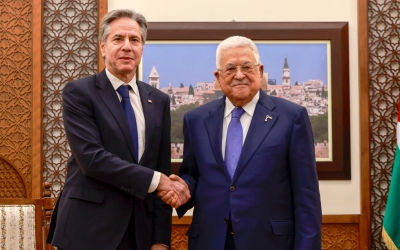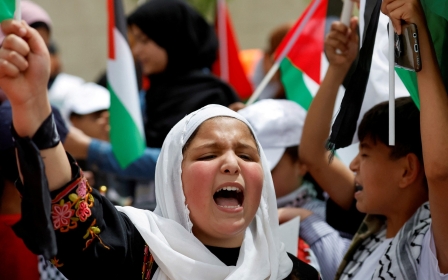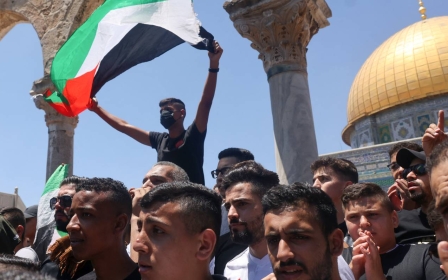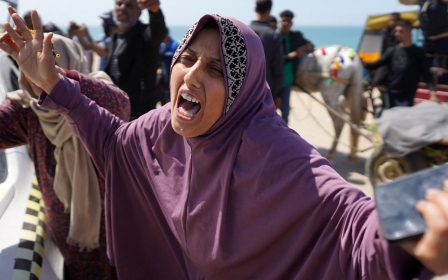Gaza war has exposed hollow nature of Palestinian citizenship of Israel

More than eight months into Israel’s genocide in Gaza, a defining moment for Palestinian people the world over, it is important to examine the specific situation of Palestinian citizens of Israel.
Living under the control of Israeli institutions and in close proximity to the Israeli public, many of whom support the devastating war on Gaza, these Palestinians will play a crucial role in the liberation struggle in the years ahead.
Firstly, it’s important to note that Israeli security discourse has long focused on five fronts: Gaza to the south, Lebanon to the north, the occupied West Bank and Iran to the east, and finally, Palestinian citizens within Israel.
The 7 October Hamas attack appeared to catch Israel unprepared, leading to escalation in Gaza and, soon afterwards, in Lebanon. As the Israeli army fights battles on those two fronts, Palestinian citizens of Israel face unprecedented political persecution, including arrests, disciplinary actions at school and work, and physical assaults.
Some members of the Israeli public have effectively synchronised their actions with the country’s security forces, labelling as “enemies” the same Palestinian citizens whom they had previously befriended, worked with, and studied alongside.
New MEE newsletter: Jerusalem Dispatch
Sign up to get the latest insights and analysis on Israel-Palestine, alongside Turkey Unpacked and other MEE newsletters
In the midst of all this, the Israeli government approved policies to encourage the mass arming of Jewish citizens, flooding public spaces with guns.
In other words, we have seen first-hand the Israeli public’s readiness to turn against Palestinian citizens - and how hollow Palestinians' Israeli citizenship is in an emergency context.
Inherent dangers
This leads us to ask: what does it mean to be Palestinian? Eight months of horrifying scenes from Gaza have illustrated how indifferent the world is to the killing of thousands of Palestinian children, and to a humanitarian disaster of biblical proportions. As this goes on, the international community debates whether to call for a ceasefire, and insists on Israel’s “right to defend itself”.
For Palestinian citizens of Israel, this has underscored both the emptiness of their citizenship, and the dangers inherent in being a Palestinian in the entire region from the river to the sea.
Follow Middle East Eye's live coverage of the Israel-Palestine war
Before the Gaza genocide began, there was an acknowledgment among all political parties and actors that Israel was far from being a liberal democracy. Still, in the margins, Palestinian political activity was allowed to challenge the system.
The war has totally eroded this understanding. Neither Israeli institutions, nor the Israeli public, remain willing to allow space for Palestinian political discourse. With this change in foundational assumptions, we have started to see political adaptations in recent months.
This reality has bigger implications for the meaning of the political parties of a colonised people within a settler-colonial state
Mansour Abbas, leader of the United Arab List, represents a new trend that - consciously or unconsciously - works to erase Palestinian identity, to the extent that in a recent interview with Israeli media, he refused to state that Israel was committing war crimes in Gaza, while condemning the actions of Hamas. (He later clarified that Israel’s onslaught in Gaza did constitute war crimes.) Abbas has also been keen to cooperate with Israeli parties in government.
At the same time, amid ongoing discussions on the future of the Palestinian Authority and the Palestine Liberation Organisation, the status quo in Palestinian politics is changing. As a result, Arab parties in Israel will have to ask themselves what it means to be a Palestinian party.
Is it about cultural identity and a shared Palestinian past? Or are Palestinian politicians part of the national liberation movement, requiring them to make difficult choices between national identity and civic identity? These are not easy decisions.
Contentious question
Going forward, the role of Arab political parties will be crucial. The Israeli war machine has adversely affected the nation’s economy, as Israel is increasingly becoming a pariah state. Palestinian citizens, who face institutional discrimination, will suffer most from this economic downturn.
Meanwhile, the discourse pushed by politicians such as Abbas will help only to whitewash Israel abroad, while encouraging Palestinians to accept budgetary crumbs in exchange for maintaining the status quo.
Other parties must present a courageous and historical counter-narrative - one that settles for nothing less than equality and historical justice. This narrative must recognise the moral and social deterioration in Israel, along with the difficulties that lie ahead, as the Gaza onslaught brings unprecedented consequences for all Palestinians.
This reality has bigger implications for the meaning of the political parties of a colonised people within a settler-colonial state. The question of political participation by Palestinian parties in the Israeli Knesset has always been contentious. Historically, their response has been that there is no alternative. But this response is unsatisfactory, given the influence of countless extra-parliamentary political organisations.
Even if we accept the importance of parliamentary participation, from the perspective of maximally exploiting positions of power, the question arises: who has the ideological authority to express the general national interest of the Palestinian people? Is it individual Knesset members, or broader political parties? In both cases, we have seen examples of the national interest being overlooked in favour of the perceived interests of Palestinian citizens of Israel.
This situation underscores the importance of the High Follow-up Committee for Arab Citizens of Israel, a political body that is supposed to represent all Palestinian citizens of Israel and maintain a national perspective - although this body is consistently weakened by those same political parties.
In other words, there are alternatives for independent and significant political activity. But is there a readiness for a new, creative and challenging form of politics that maintains open communication with Palestinians everywhere? Or are we just going to see more attempts to continue the pre-7 October status quo?
The views expressed in this article belong to the authors and do not necessarily reflect the editorial policy of Middle East Eye.
Middle East Eye delivers independent and unrivalled coverage and analysis of the Middle East, North Africa and beyond. To learn more about republishing this content and the associated fees, please fill out this form. More about MEE can be found here.






